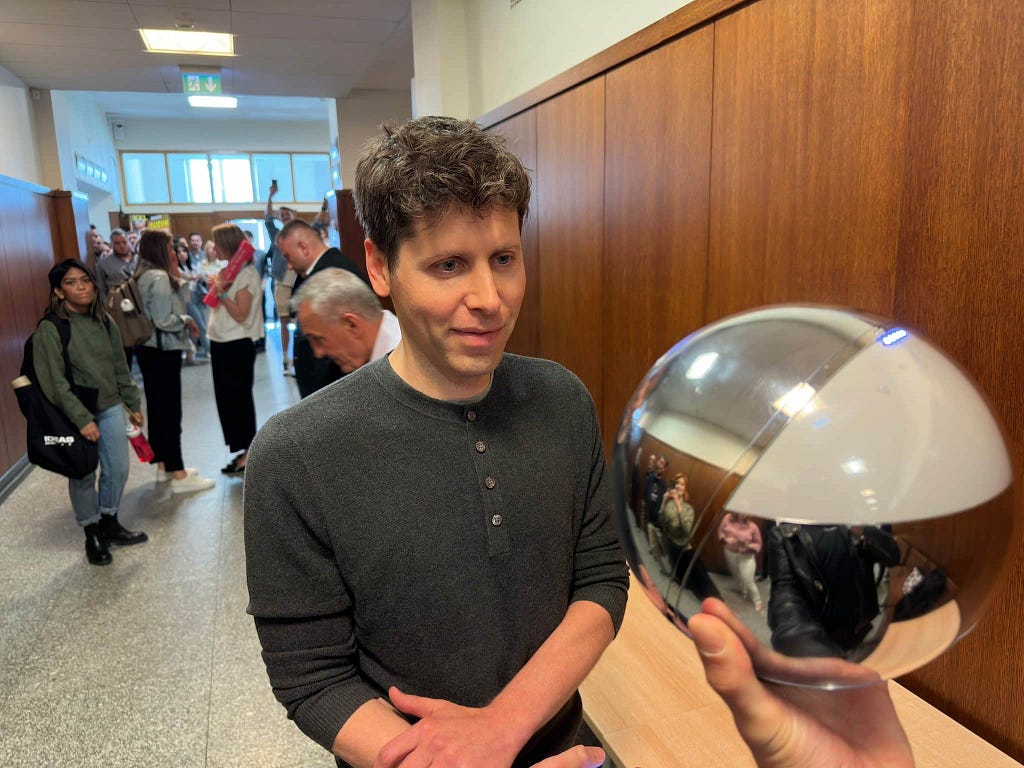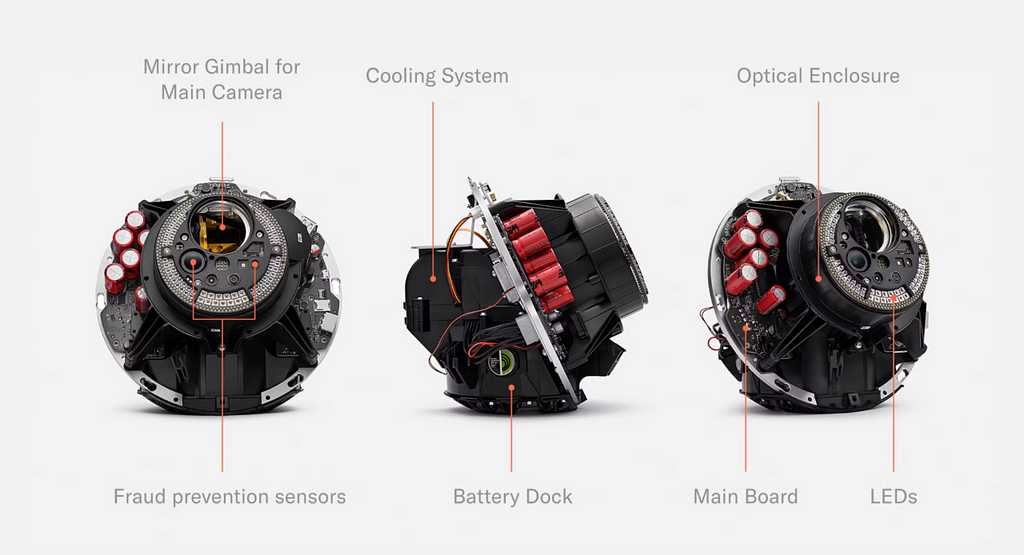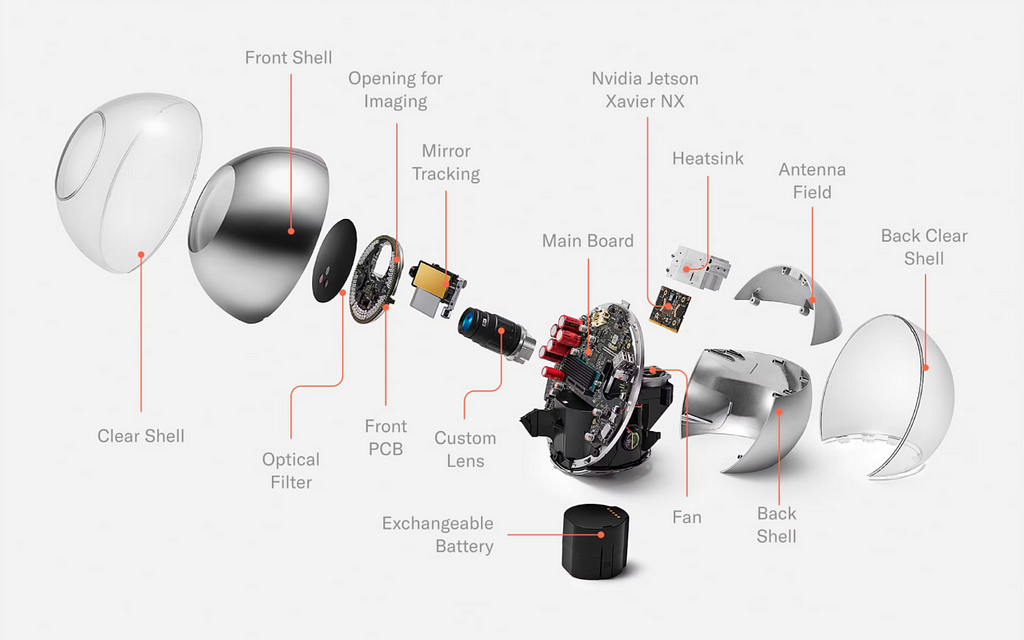AI and Blockchain — Future Unlocked
With the rapid increase and change of technology nowadays, verifying human identity and distinguishing it from bots is rapidly gaining traction. A solution to this problem has inspired one of the most ambitious projects yet to be undertaken — Worldcoin, which is now known as World Network (or quite simply “the World”). The project is led by Sam Altman, co-founder and CEO of OpenAI, and Alex Blania, who can also claim stellar technological expertise and seeks to build a universal identity verification system that uses biometrics and a strange device called an Orb.
 Source: Biometric Update
Source: Biometric UpdateWhat seemed nearly impossible in 2019, has markedly changed for the better, especially with Altman’s frenzy and the growing need to check people’s identities in an almost AI-controlled world. The most recent version of this ambition was presented at Altman and Blania’s recent event in San Francisco, where they introduced their vision of the World Network for the years to come, with the launch of new identity verification hardware, software and services to be available to the world.
The Orb: More Than Meets the EyeThe Orb serves as the centrepiece of the World’s biometric verification system. An object, metallic, which scans users’ irises, thereby providing a digital identity of the user’s biological signature. At the event, the latest version of the Orb was announced, showcasing a gleamy pearlescent finish running on Nvidia’s Jetson chipset or nearly five times the AI performance of its preceding version. This is in favor of the enhanced speed of identity verification and therefore makes it most efficient at whatever cost.
 Source: World
Source: WorldThat being said, it seems somewhat futuristic and innovative, but it escapes the simplicity of its basic function: the scanning of eyeballs. Iris data is taken and subsequently encrypted by the app running on the user’s device. This raised several questions on information privacy; the most debated would have been how such sensitive information is treated and secured. The system’s privacy concerns were addressed by Blania, one of the project’s co-founders, who insisted that data remain encrypted and that no central database was ever made to store it.
A Global Network Powered by BiometricsThe World is more than just about the Orb; it is more about the global World Network: a blockchain-based infrastructure intent on providing identity verification on a global basis. The network hopes to have millions of users, a number anticipated to grow from its approximate pool of 7 million World ID holders who have already gained Orb verification. This newly defined term “Orb-verified”-denotes a group that has already undergone iris scanning.
 Source: World
Source: WorldThe world will be introducing more services to make this biometric future even more secure. Most prominently in these new offerings is Deep Face. In today’s world, rife with deepfakes and identity theft, Deep Face stands to ensure that during video calls one is who he/she claims to be. While not yet clear as to how this will work alongside the current crop of communication apps such as FaceTime, Zoom, and WhatsApp, it is conceived that World will be a validation layer enabling the identification of imposters.
World’s Blockchain and Future Financial NetworkCurrently, biometric verification is what World is focused on, but the project is laying the groundwork for the larger-scale blockchain network, touted to be “the world’s first blockchain designed for humans.” This new blockchain will serve as the infrastructure for World ID holders and World app users, enabling classically purchased digital assets and identity verification on a global scale.
 Source: World
Source: WorldBlania and Altman envision that this blockchain network will eventually become the “largest finance network on the planet,” mirroring how PayPal eventually became an online payment pioneer. The details of how World will further monetize remain unclear, but the project may implement monetization activities such as transaction processing fees and other financial services in due course. For now, the app and biometric scanning services are free; the better focus is on scaling and acquiring users.
Privacy Concerns and Regulatory ChallengesThe world, however, is not without controversy in pursuit of its ambition. Privacy advocates and government regulators have raised questions on the way biometric data is being collected and handled. In 2023, World had to suspend enrollment in Kenya and was under investigation in Germany, Brazil, India, South Korea, and Kenya over its data storage practices.
Since then, Blania has assured that the World is trying out “a thousand things” to improve transparency and consent, from setting up operational teams in every market to ensuring that users know how their information is going to be used. Nonetheless, the project’s focusing on markets outside the US, where regulations on crypto transactions are more straightforward, means Worldcoin could still expect scrutiny during its roll-out.
In conclusion, at its basis, the World Network is an audacious attempt at solving one of the central issues in the AI age: verifying someone as human. World will use biometrics technology in delivering a decentralized, secure, and scalable system for identity verification applications ranging widely from digital payments to fraud prevention.
While concerns remain about privacy, data security, and biometric data monitoring in our daily lives, the bold aspiration behind Opera of making a global identity network is worth observing.
Will Orb and World Network be the Future of Biometric Identity Verification? was originally published in Coinmonks on Medium, where people are continuing the conversation by highlighting and responding to this story.
